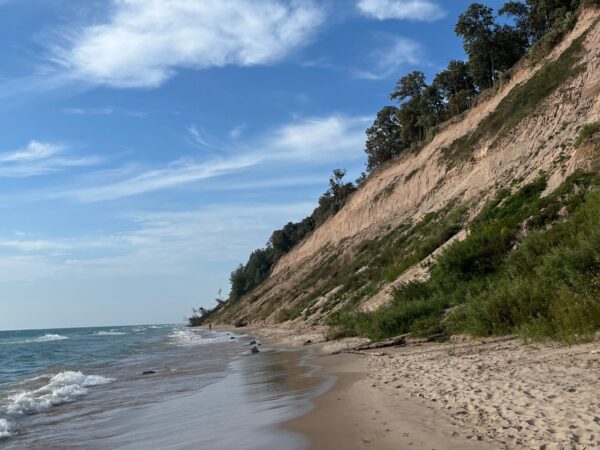
Jump to your state:
Canada:
The Great Lakes are in a period of high water levels. Shoreline residents and property owners are already struggling to grapple with both the high water and the impacts of it.
The U.S. Army Corps of Engineers tracks the water levels of all five lakes, and its Jan. 17 weekly forecast showed an across-the-board increase in average water levels from then and the same time last year. Lake Superior showed a 3-inch increase, lakes Michigan and Huron each had an 18-inch increase, while lakes Erie and Ontario had 8-inches and 9-inches respectively.
Many properties have been flooded, but another consequence of the high water and intense storms is an eroding shoreline, leading to unstable foundations and collapsed houses.
In Muskegon County on New Year’s Eve, a beach house on the edge of Lake Michigan collapsed after its foundation eroded away.
For property owners concerned about their shoreline houses and cottages, here are some resources you can turn to for forecasts, permits, processes and advice on handling coastal erosion and changes:
Illinois and Indiana
The Illinois-Indiana Sea Grant has a website of resources geared toward helping communities prepare for climate change impacts. On the site are links to vulnerability self-assessments, reports, news and workshops relating to planning for flooding and other impacts.
The Illinois-Indiana Sea Grant also has a series of videos, Stormwater@Home, that shows homeowners ways to manage stormwater on their property, such as dealing with runoff, pollution and prevention methods.
For Indiana specifically, the Indiana Department of Natural Resources has a page on the Lake Michigan Coastal Program, with information on flooding, grants, ecosystems and managing septic systems.
Michigan
The Michigan Department of Environment, Great Lakes, and Energy has a webpage addressing high water and soil erosion. The page provides links to resources on shoreline protection, permits and contractors, along with general information about high water on the Great Lakes. It also has information on shoreline erosion, including a webinar on how to communicate with EGLE about the issue.
The Michigan Sea Grant has a shoreline management guide for coastal landowners available online.
Minnesota
The Minnesota Sea Grant has a webpage on coastal communities with information about water levels, storms, green infrastructure, rip currents and more.
The Metropolitan Council in the Twin Cities region has an online climate vulnerability assessment with tools for extreme heat and localized flooding.
New York
The state of New York has a webpage on Lake Ontario flooding with information and resources on flood preparation and safety tips.
The state also has a page dedicated to the Lake Ontario Resiliency and Economic Development Initiative and its various shoreline resilience projects.
Ohio
The Ohio Sea Grant has a number of fact sheets on Great Lakes coastal concerns such as coastal storms, shore erosion and shoreline community needs.
Ontario
The government of Ontario has a page with general information on Great lakes water levels.
Pennsylvania
The Pennsylvania Sea Grant hosted the Pennsylvania Lake Erie Environmental Forum, which covers a series of Lake Erie-related issues. The last forum, in October, was on lake levels, and the presentations and discussions on impacts, concerns and planning were archived online.
The Community Resilience Action Network of Erie gathered together a range of resources relating to lake water levels including tracking tools, news, impacts and more.
Wisconsin
The Wisconsin Department of Natural Resources has a page on shoreline erosion, with resources for both homeowners and contractors. It contains information about permits, finding contractors, dredging as well as the process for emergency shoreline protection projects to bypass the regular process.
The University of Wisconsin Sea Grant Institute has a two-page summary of resources for erosion and flooding for coastal homeowners available online.
The Southeastern Wisconsin Coastal Resilience project has a range of resources collected on adapting to changing coastlines, stabilizing slopes, erosion control and more.
1 Comment
-
Awesome content and very informative that everyone can refer through it to prevent erosion.




